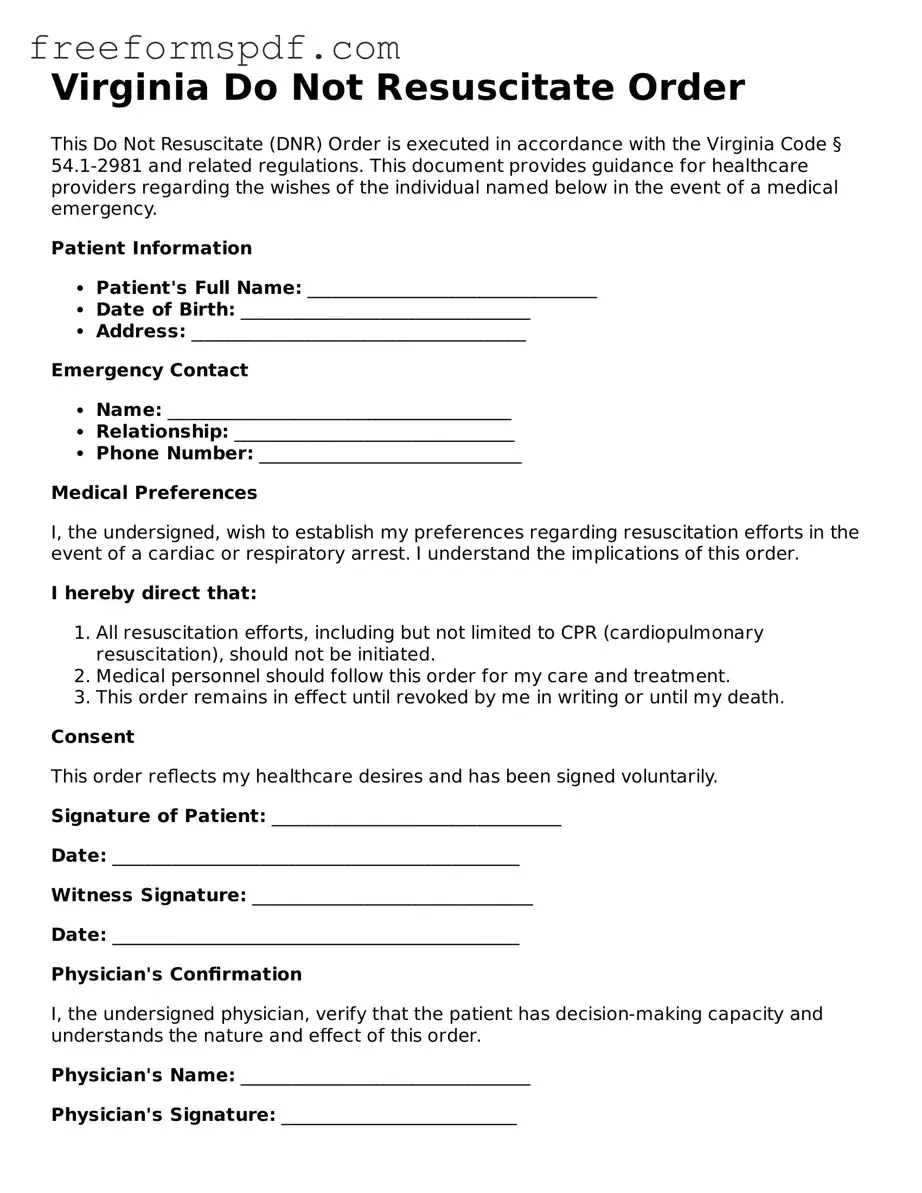Attorney-Verified Do Not Resuscitate Order Document for Virginia State
Common mistakes
-
Failing to include the patient's full name. This critical detail is necessary to ensure that the order is properly associated with the correct individual.
-
Not signing the form. The absence of a signature can render the document invalid, as it demonstrates the patient's or their authorized representative's consent.
-
Overlooking the date. Without a date, it is unclear when the order was established, which can lead to confusion in medical situations.
-
Using unclear language. Ambiguous instructions can lead to misinterpretation by healthcare providers, potentially undermining the intent of the order.
-
Failing to inform healthcare providers. It is essential to communicate the existence of the Do Not Resuscitate Order to all relevant medical personnel to ensure it is honored.
-
Not updating the form when circumstances change. Life events such as recovery from a serious illness or a change in the patient’s wishes should prompt a review and potential revision of the order.
-
Neglecting to include the signature of a witness when required. Some jurisdictions may require a witness to validate the order, and failing to do so can invalidate the document.
-
Assuming that verbal instructions are sufficient. A written order is necessary for legal and medical clarity; verbal requests may not be honored.
-
Not consulting with a healthcare professional before filling out the form. Guidance from medical personnel can help clarify the implications of a Do Not Resuscitate Order and ensure that it aligns with the patient’s wishes.
Learn More on This Form
-
What is a Do Not Resuscitate (DNR) Order?
A Do Not Resuscitate Order is a legal document that allows a person to refuse resuscitation efforts in the event of a medical emergency. This means that if a person's heart stops beating or they stop breathing, medical personnel will not perform CPR or other life-saving measures.
-
Who can create a DNR Order in Virginia?
In Virginia, any adult who is capable of making their own medical decisions can create a DNR Order. This includes individuals who are at least 18 years old and have the mental capacity to understand the implications of such a decision.
-
How do I obtain a DNR Order form in Virginia?
You can obtain a DNR Order form from various sources, including hospitals, healthcare providers, and online resources. The Virginia Department of Health also provides access to the form on its website. It is important to ensure that you have the correct and most current version of the form.
-
What information is required on the DNR Order form?
The DNR Order form typically requires the patient's name, date of birth, and a statement of their wishes regarding resuscitation. It also requires the signature of the patient or their legal representative, along with the signature of a witness or a healthcare provider, depending on the specific requirements of the form.
-
Can a DNR Order be revoked?
Yes, a DNR Order can be revoked at any time. The patient or their legal representative can inform healthcare providers of their decision to cancel the order. It is advisable to document this revocation in writing to avoid any confusion during a medical emergency.
-
Where should I keep my DNR Order?
It is essential to keep the DNR Order in a place that is easily accessible. Many people choose to keep a copy in their medical records, with their primary healthcare provider, or in a visible location at home. Informing family members and caregivers about the order is also crucial so that they know your wishes.
Misconceptions
Understanding the Virginia Do Not Resuscitate (DNR) Order form is crucial for making informed healthcare decisions. However, several misconceptions can lead to confusion. Here are four common misunderstandings about the DNR form:
- A DNR means no medical treatment at all. This is not true. A DNR specifically addresses resuscitation efforts in the event of cardiac or respiratory arrest. Other medical treatments, such as pain management and comfort care, can still be provided.
- A DNR is only for terminally ill patients. Many believe that DNR orders are only for those at the end of life. In reality, anyone can choose to have a DNR, regardless of their health status. The decision should reflect personal wishes about resuscitation efforts.
- A DNR is permanent and cannot be changed. This is a misconception. Individuals can change or revoke their DNR orders at any time, as long as they are competent to make such decisions. It’s important to communicate any changes to healthcare providers.
- Having a DNR means you will receive poor care. Some worry that signing a DNR will lead to a lack of attention or lower quality of care. In fact, a DNR order does not affect the overall quality of medical care. Healthcare providers are still committed to providing appropriate and compassionate treatment.
By clarifying these misconceptions, individuals can better navigate their healthcare choices and ensure their wishes are respected.
Some Other Do Not Resuscitate Order State Templates
How Old Do You Have to Be to Sign a Dnr - This order can be especially important for individuals with terminal illnesses or serious health conditions.
For those navigating the complexities of homeschooling, understanding the "Arizona Homeschool Letter of Intent" requirements will significantly streamline the process of compliance with state regulations. This form acts as a formal notification to the educational authorities and is a critical step for parents embarking on this educational journey. Find more information on this vital document at important details regarding the Homeschool Letter of Intent procedure.
Is a Dnr an Advance Directive - A DNR order must be readily available and easily accessible in medical records for it to be executed appropriately.
